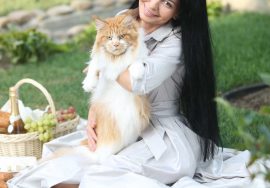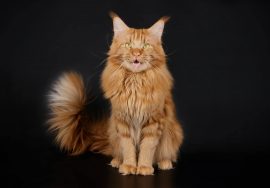MAINE COON MYTHS
MAINE COON MYTHS
It’s no secret that Maine Coons are the largest domestic cats. A lot of people love these animals, and rightly so! But there are those who, guided by stereotypes and misconceptions, draw completely wrong conclusions about the Coons. Here are the fallacies we are talking about:
MYTH 1.
 In order to keep a Maine Coon Cat, you need at least 1 kg of meat per day. But what’s it really like? We no longer live in the Stone Age. Modern food, especially super-premium and premium, contains nutrients in such an amount that easily covers the needs of both kittens and adults. And usually the cost of food determines its quality, ability to be absorbed effectively, and the required daily dose. For a 4-pound cat 60 grams of food per day will be enough, provided that it’s high-quality. You should look for this kind of food in specialized pet stores, because it will be difficult to find it in chain supermarkets. Of course, your favorite cat is still a creature of nature, and it should eat natural products, including meat. By the way, you should not take the other extreme – to keep the cat only on meat. It can lead to health problems, there should be a balanced meat mix. In any case, you shouldn’t forget to change the water.
In order to keep a Maine Coon Cat, you need at least 1 kg of meat per day. But what’s it really like? We no longer live in the Stone Age. Modern food, especially super-premium and premium, contains nutrients in such an amount that easily covers the needs of both kittens and adults. And usually the cost of food determines its quality, ability to be absorbed effectively, and the required daily dose. For a 4-pound cat 60 grams of food per day will be enough, provided that it’s high-quality. You should look for this kind of food in specialized pet stores, because it will be difficult to find it in chain supermarkets. Of course, your favorite cat is still a creature of nature, and it should eat natural products, including meat. By the way, you should not take the other extreme – to keep the cat only on meat. It can lead to health problems, there should be a balanced meat mix. In any case, you shouldn’t forget to change the water.
MYTH 2.
A city apartment is too small for a Maine Coon. In reality this is certainly not true. Cats know how to feel comfortable and find entertainment for themselves in virtually any apartment. Just give the kitten quiet time to get used to the new surroundings, and it will quickly find shelter for itself. Each cat needs several things, conventionally speaking: a hole and a mountain. That is, some place where it can hide and nobody will touch it, and something like an observation point. And it is not obligatory to buy expensive playhouses and stuff. It would be very disappointing to buy a house for your cat only to find out that your cat did not like it, and all the cat wanted was to be able to sometimes hide behind the couch. And here’s what should be in the apartment for sure – a scratching post.
MYTH 3.
Maine Coons are harsh and unsociable. This is also a myth. Coons can sometimes seem severe, but it is only an external manifestation. They are ordinarily very balanced cats, they combine kindness with calmness. Maine Coons are able to quickly absorb information, especially when it comes to the rules of conduct. The main thing here is for the owner to be consistent, and not to break the previously set limits. If the cat is forbidden to climb up on the table from the beginning – then this restriction must be strictly adhered to, and then the coon will strictly follow it. At first you should give it time to get used to the rule, maybe you will have to take the cat off the table a few times. But in general, this is a very smart breed. By the way, many people do not know, but if from the beginning of communication with your pet you won’t use the well-known “kitty-kitty”, and call the cat by name only, then it will learn to respond only to its name. Maine Coons are quite different from most of the cats we are used to in how they communicate with people. For example, the cats of this breed almost never meow, they purr. But despite this, among them there are very different characters – more reserved or, conversely, more sociable, but they communicate it in their own ways. In most cases, as they become accustomed to the house and its inhabitants, Maine Coons will choose someone from the people with whom they will communicate more often and closer than with others. Coons become attached to people, not places, for this reason this breed tolerates moving well when it happens with “their” owner.
MYTH 4.
 Dogs and kittens don’t get along well with other animals and children. This is not true. Maine Coons can happily coexist with children, and with other large-ish animals. They, nevertheless, do not want to live with (because of possible awakening of “hunter” instincts in coons) hamsters and other small animals. Parrots are also in the risk group. In communication with children Maine Coons also have no problems, but in this case it all depends on the behavior of the child. If the kid respects the cat, and does not pull the tail or grasp the hands at any moment, the coon will be happy to get on with the child. Especially if the familiar things to the cat are used, such as toys and wags. In general, the child can become the best companion for the coon, because the child has a lot of interesting toys and games for the cat. For example, Maine Coon cat can “steal” the toys and run away while the baby will be looking for it, and they will have a lot of fun, or vice versa the baby will throw the toy and the coon will bring it, so that they can run away again and get the new portion of emotions. By the way, Coons love it when everything is in its place, and it can be an additional incentive for the baby to learn not to scatter toys anywhere.
Dogs and kittens don’t get along well with other animals and children. This is not true. Maine Coons can happily coexist with children, and with other large-ish animals. They, nevertheless, do not want to live with (because of possible awakening of “hunter” instincts in coons) hamsters and other small animals. Parrots are also in the risk group. In communication with children Maine Coons also have no problems, but in this case it all depends on the behavior of the child. If the kid respects the cat, and does not pull the tail or grasp the hands at any moment, the coon will be happy to get on with the child. Especially if the familiar things to the cat are used, such as toys and wags. In general, the child can become the best companion for the coon, because the child has a lot of interesting toys and games for the cat. For example, Maine Coon cat can “steal” the toys and run away while the baby will be looking for it, and they will have a lot of fun, or vice versa the baby will throw the toy and the coon will bring it, so that they can run away again and get the new portion of emotions. By the way, Coons love it when everything is in its place, and it can be an additional incentive for the baby to learn not to scatter toys anywhere.
MYTH 5.
Maine Coons have poor health. And this statement is also wrong, because the health of not only the cat but of everybody depends on many external factors, and not just on the breed. In this case, we are talking about the conditions of housing, quality of food, stress, how carefully the periodic examinations are conducted (and whether they are conducted at all), whether the animals are vaccinated in time, whether they get the necessary vitamins and nutrients in full and so on. If we talk about genetic diseases, a competent breeder will never allow the breeding of such animals, necessarily checking the health of the future parents of kittens. Of course, a good breeder will always help the new owners of a kitten from his cattery with tips on caring for the baby.
Maine Coons grow to 15-20 pounds. Concerning this myth there is an interesting story. When the first translation of detailed information about this breed appeared in Russian, the translator mixed up pounds and kilograms. The average weight of a Coon is 15-20 pounds (not kilograms), which is about 7 kilograms. They come to their adult weight in 4 years. Of course, there are larger cats, but certainly not 15 and certainly not 20 kilos
Here we have debunked only the most common myths and misconceptions concerning Maine Coons. But in reality there are many more, so follow our articles, as we will gradually tell the truth about this wonderful breed of cat.



